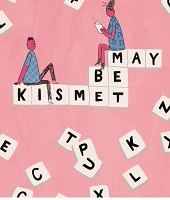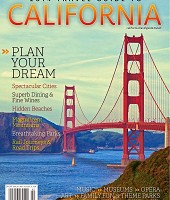AARP: “Conquer the Art of Really Getting Away”
Put pen to paper on your next trip and learn to slow down, unplug, and connect with yourself
by Lavinia Spalding (google+)Not so long ago, the word “getaway” actually meant get away. Beyond the odd scribbled postcard and crackling phone call, out of country meant out of touch. But it’s an increasingly antiquated notion. These days, whether you’re riding a taxi in Seoul or trekking Mt. Everest, chances are you can score free Wi-Fi long enough to Facebook, Instagram, Tweet, text, or Skype your way home—or, God forbid, to the office. While there’s no denying the perks of an ultra-connected world, these in-the-moment updates actually pull us out of the moment. Yet travel offers a rare opportunity to slow down, unplug, and connect with yourself. And carving out the time is easier than you think—you need only pack a journal.
Travel journaling is a ritual, a way of connecting more deeply to your physical location and your own experience.
“Sitting still at the end of the traveling day forces me to focus on and capture the details of my surroundings,” says Patti Shales Lefkos, a journalist and traveler. “The act of writing in my journal allows me to reflect on the day’s activities, the people I’ve met, the places I’ve seen, and my feelings at the time.”
Kickstart the habit
Unless you’re a seasoned journal-keeper, a blank moleskin can be a seriously daunting prospect. Where to begin? Start writing before you leave; you’ll kickstart the journaling habit and trigger enthusiasm for your adventure. Begin by scribbling lists—things to pack, foreign phrases, recommendations for local eats, budgets, travel plans. Commit to at least a few words a day prior to departure. Then, once you’ve set out, assign yourself a manageable journaling schedule (five minutes a day, or a few sentences a night). Don’t be overambitious, and try to stick to your plan. You’ll thank yourself later.
Come to your senses—all of them
Too many travel journals wind up in trash heaps after being filled with pages of mind-numbing detail: the museum visited, the train taken, the schnitzel eaten. Aim to go deeper. One technique is to place yourself in the middle of the action—a bistro table in a crowded piazza, a wildlife park bench, a body-bumping disco, a rowdy chicken bus—and close your eyes. Most of us suffer from an overreliance on our sense of sight, so enlisting the other senses is key. Concentrate on what you smell, hear, touch, and taste. Then write about it (you can open your eyes for this part). You’ll become more attuned to your new surroundings. And years later when you dust off your notebook and dip into it, these sensory memories will launch you straight back to the moment. “When I reread my journal,” says Lefkos, “I’m instantly transported to the exact spot where I sat writing—the weather, the color of the sky, my companions, the dinner conversation, and my mood at the time.”
Use the journal as a tool for self-discovery
Travel can be enriching, exciting, awe-inspiring, sometimes even brutal. It’s possible, on the road, to lose everything—from your way to your passport to your lunch—in one 24-hour period. Travel can challenge long-held beliefs of what’s right and wrong; Your experiences abroad might cause you to reassess your priorities. Maybe even your life’s purpose.
Use the journal to process the changes that occur when your mind expands, and ask yourself hard questions: “What’s the most unpleasant part of this trip? The most bizarre? How did my expectations differ from reality? What have I learned?” Be honest in your answers. After all, travel is one of our greatest opportunities for personal growth. But as the Persian poet Moslih Eddin Saadi said, “A traveler without observation is a bird without wings.” Try journaling and see how high you can fly.
Going: New Orleans, The Southern US City Where Jazz Was Born
Parents: I Grew Up in a Haunted House—Here’s What I Tell My Child About Ghosts
AFAR: Seoul Food
Off Assignment, Letter to a Stranger: “To the Shopkeeper in Fez”
The Bold Italic: “Working Three Jobs Nearly Killed Me”
AirBnB Magazine: “So I Slept in a ...Cave”
AAA Westways Magazine: “Korean Encore”
AFAR.com: “Everything You Need to Know About Jazz Fest”
AFAR.com: “Get Beyond the Beads: The 101 on Mardi Gras Throws”
AFAR.com: “The Art of Eating Crawfish in New Orleans”
AFAR.com: “Find New Orleans’s Soul at These 6 Mini-Museums”
Ms. Magazine: “Politics is on the Menu at Hell’s Backbone Grill”
AirBnB Magazine: “New Orleans for the Celebratory”
Off Assignment, Letter to a Stranger: “To the one who was supposed to get away”
Off Assignment, Letter to a Stranger: “To Old Johnny”
Viator: “Coming Full Circle”
World Hum: “How Korean Karaoke Changed my Life”
Independent Bookstore Day’s anthology: “My Lesson from Hell”
-
The New York Times, Modern Love: “Goodbye, My Fantasy Man”
I wasn’t willing to settle for less than kismet. But chasing a romantic illusion nearly kept me from finding love. -- The night I agreed to try online dating, I told my roommate Meghan I hoped I wouldn’t meet anyone because that wasn’t the kind of story . . .
-
River Teeth: A lot of Tomorrows
We are at the dinner table when my young son asks, “The day after a lot of tomorrows, will we build a treehouse?” I want to scoop him in my arms, this boy so eager and fresh, so tall his forehead meets my shoulder. If I could, I would lift his body above . . .
-
AFAR: Seoul Food
I still clearly remember my first meal in South Korea. I had just arrived in the country, fresh out of college and ready to begin a job teaching English. My new boss had whisked me from the airport to a barbecue restaurant, where I’d watched in panic as . . .
-
The New R&R
. . .
 Life Reimagined-AARP
Life Reimagined-AARP



























